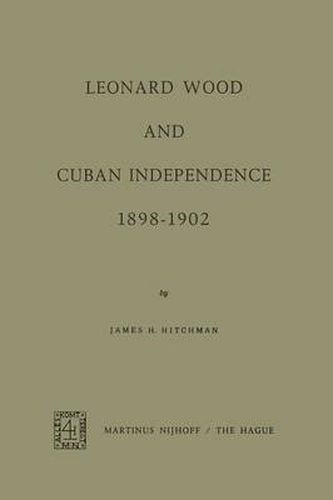Readings Newsletter
Become a Readings Member to make your shopping experience even easier.
Sign in or sign up for free!
You’re not far away from qualifying for FREE standard shipping within Australia
You’ve qualified for FREE standard shipping within Australia
The cart is loading…






This title is printed to order. This book may have been self-published. If so, we cannot guarantee the quality of the content. In the main most books will have gone through the editing process however some may not. We therefore suggest that you be aware of this before ordering this book. If in doubt check either the author or publisher’s details as we are unable to accept any returns unless they are faulty. Please contact us if you have any questions.
This is a study of the Military Government of Cuba from 1898 to 1902. Tracing and explaining the actions of General Leonard Wood’s adminis tration during those years reveals how the United States Government re solved the questions of independence, strategic security, and economic inter ests in regard to Cuba. Leonard Wood, Secretary of War Elihu Root, Senator Orville H. Platt, and President William McKinley formulated and carried out policies that had a strong influence on subsequent Cuban-American relations. The broader aspects of this study, civil-military relations and American imperialism, are topics of importance to all citizens today. This is institutional and biographical history, written in the belief that a full ac count of the men, action, and circumstances will add to our understanding of the period when the United States emerged as a world power. I am indebted to Professors Gerald E. Wheeler of San Jose State College and Armin Rappaport of the University of California, San Diego, who di rected my research in the early stages, and to Professor Eric Bellquist of the University of California, Berkeley, for his criticism of the manuscript when it was in dissertation stage. To Professor Raymond J. Sontag I would like to pay special tribute for his guidance and inspiration through the years. The assistance of my mother, Mrs. Sue Hitchman, is deeply appreciated. My thanks go also to the staffs at the Library of the U. S.
$9.00 standard shipping within Australia
FREE standard shipping within Australia for orders over $100.00
Express & International shipping calculated at checkout
This title is printed to order. This book may have been self-published. If so, we cannot guarantee the quality of the content. In the main most books will have gone through the editing process however some may not. We therefore suggest that you be aware of this before ordering this book. If in doubt check either the author or publisher’s details as we are unable to accept any returns unless they are faulty. Please contact us if you have any questions.
This is a study of the Military Government of Cuba from 1898 to 1902. Tracing and explaining the actions of General Leonard Wood’s adminis tration during those years reveals how the United States Government re solved the questions of independence, strategic security, and economic inter ests in regard to Cuba. Leonard Wood, Secretary of War Elihu Root, Senator Orville H. Platt, and President William McKinley formulated and carried out policies that had a strong influence on subsequent Cuban-American relations. The broader aspects of this study, civil-military relations and American imperialism, are topics of importance to all citizens today. This is institutional and biographical history, written in the belief that a full ac count of the men, action, and circumstances will add to our understanding of the period when the United States emerged as a world power. I am indebted to Professors Gerald E. Wheeler of San Jose State College and Armin Rappaport of the University of California, San Diego, who di rected my research in the early stages, and to Professor Eric Bellquist of the University of California, Berkeley, for his criticism of the manuscript when it was in dissertation stage. To Professor Raymond J. Sontag I would like to pay special tribute for his guidance and inspiration through the years. The assistance of my mother, Mrs. Sue Hitchman, is deeply appreciated. My thanks go also to the staffs at the Library of the U. S.